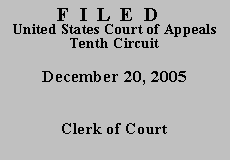

| UNITED STATES OF AMERICA, |
(
|
Briefly, by way of background, Mr. Bell was convicted in 1997 of conspiracy to distribute cocaine powder and cocaine base (i.e., crack), and sentenced to life imprisonment. This court affirmed that conviction in United States v. Bell, 154 F.3d 1205 (10th Cir. 1998). Next, Mr. Bell filed a motion for judgment of acquittal and/or a new trial on February 22, 1999. The district court construed the motion as a request for habeas relief under § 2255, and denied it because Mr. Bell failed to present any newly discovered evidence. Mr. Bell sought a COA in order to appeal the district court's denial of his § 2255 motion. In an unpublished opinion, we determined that the district court did not err in treating the motion as one requesting relief under § 2255, and subsequently denied Mr. Bell's request for a COA. United States v. Bell, 1999 WL 713320 at *1 (10th Cir. Sept. 14, 1999) (unpublished).
We agree with the district court that the present motion to reconsider may be characterized as a Rule 60(b) motion. In the § 2254 context, the Supreme Court recently held that a Rule 60(b) motion should not be construed as a second or successive habeas petition where it does not add a new claim for relief or challenge the district court's resolution of prior claims on the merits. Gonzalez v. Crosby, 125 S. Ct. 2641, 2648 (2005). Where a motion challenges a perceived "defect in the integrity of the proceedings" under § 2254, a Rule 60(b) motion is appropriate. The reasoning of Gonzalez v. Crosby has been extended to § 2255 motions which implicate similar concerns of successiveness. United States v. Scott, 414 F.3d 815, 816 (7th Cir. 2005).
With liberal construction, Mr. Bell may be said to be challenging the mechanics of the disposition of his prior motion. Mr. Bell needs a COA to proceed. Gonzalez, 125 S. Ct. at 2650 n.7. Where the district court dismisses a petition on procedural grounds, a COA requires the inmate to demonstrate that it is reasonably debatable whether (1) the petition states a valid claim of the denial of a constitutional right, and (2) the district court's procedural ruling is correct. Slack v. McDaniel, 529 U.S. 473, 484 (2000); see also Miller-El v. Cockrell, 537 U.S. 322, 327 (2003).
The district court's resolution is not debatable at all. Given an abuse of discretion standard of review, no reasonable jurist could conclude that the district court abused its discretion in denying the Rule 60(b) motion, which in and of itself was successive of the initial motion to reopen. Moreover, we had approved of the district court's handling of the matter as a § 2255 motion previously. Bell, 1999 WL 713320 at *1.
We DENY IFP, DENY a COA, and DISMISS the appeal.
Entered for the Court
Paul J. Kelly, Jr.
Circuit Judge
Click footnote number to return to corresponding location in the text.
1.Mr. Bell also seeks to proceed in forma pauperis ("IFP").